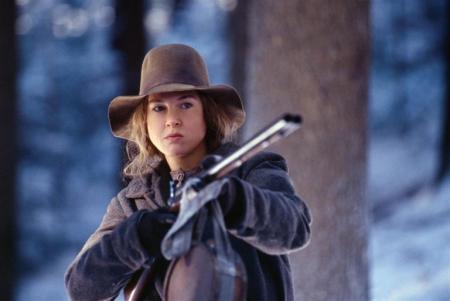Ok so normally I can’t stand Jude Law (ESPECIALLY in The Holiday, I mean WHAT is the with the fake tan? You live in England, and it’s SNOWING. And you’re cast as Kate Winslet’s BROTHER. In what way is a tan convincing?) But I did kind of warm to him in Cold Mountain, I think it was the fact he barely spoke a word, and played very convincingly the social awkwardness that comes with professing your love to someone before you know them properly, then being re-united with them years later after a war and wondering how to act and treat them. Which, basically, is the story of Ada (Nicole Kidman) and Inman (Jude Law) in Cold Mountain.
 |
| Renee as Ruby |
I can talk about farming in Latin. I can read French. I can lace up a corset, God knows. I can name the principal rivers in Europe, just don't ask me to name one stream in this county! I can embroider but I can't darn! I can arrange cut flowers but I can't grow them!
But within a few short months, Ruby has transformed Ada from profoundly useless Southern Belle to hardy, herb-growing, fence-building, pie-baking, not-starving lady-now-mountain-girl. Ada can repay her neighbours’ charity by cooking them food. She can protect her and Ruby’s friends, (deserters from the army) with a shotgun that she has learnt to shoot. In losing her role as lady, Ada gains the ability to survive as a woman dependent only on herself and other women.
What is most interesting about this transformation is that Ada arrives in Cold Mountain as the traditional, beautiful Southern Belle – but one physically trapped by this position, not just by her corset, but by her lack of skills which force her into poverty once she is away from the money and society of men. It is only in shunning her role as lady that Ada is able to regain pride in herself, can participate in social transaction without shame (by baking food for her neighbours as payment) and gains a friend. This does come at some cost, though – for while her father’s death, a symbolic death of the patriarch, creates the space for Ruby to enter the father’s house and transform his daughter, Ada still experiences grief at this loss. She must also sell her beloved piano – the one thing of her old life that she loves and is good at – to have enough money to survive one particularly cold winter.
 |
| The doomed couple. |
The other main cost is her loss of Inman. She does remain dependent on his memory and the possibility he will return, to get through difficult times. Initially, I felt uncomfortable about this because I felt it undermined the feminine independence she develops with Ruby. However, when Inman does finally return, years down the track, it’s actually not too clichéd. They don’t run to each other and make out. She nearly shoots him, then realizes who it is, and then they have an awkward conversation about how strange it is too see each other. (Then of course they get over it, hook up overnight in a mountain shack, and then he gets shot the following day protecting them from the City Guard. And of course she got pregnant from the one night they spent together and it’s the whole romantically tragic thing. But anyway).
While this ending was a bit predictable and attempted to pull every heartstring the audience had (admittedly, I cried LOTS) it does point to something quite profound: Inman’s return without death was actually an impossibility. This type of transformed, independent woman cannot exist with the providing husband on her arm. Ruby, on the other hand, who grew up with survival skills and who effectively taught herself independence, can get married (and does). Ada’s narrative seems suggest that there is something about the act of shedding an old feminine role, or the act of removing a stereotype cast upon you, which inevitably involves loss, and probably some sort of masculine loss. It is this loss which catalyses Ada's transformation. Hence, Inman needs to die for Ada to remain who she has become, while Ruby can marry and have children because she has not has to “shed” anything: she is a type of independent woman who can choose a man without needing to revert to dependence on him.
Or something like that, anyway. Maybe I’ve been WAAAAY too sucked in by Hollywood, but as you know, I always am! Because it’s FREAKING COLD in Edinburgh right, and much nicer to stay inside watching and fantasizing about Hollywood that go outside in the rain. (But I still love Edinburgh. Don’t get me wrong).

No comments:
Post a Comment